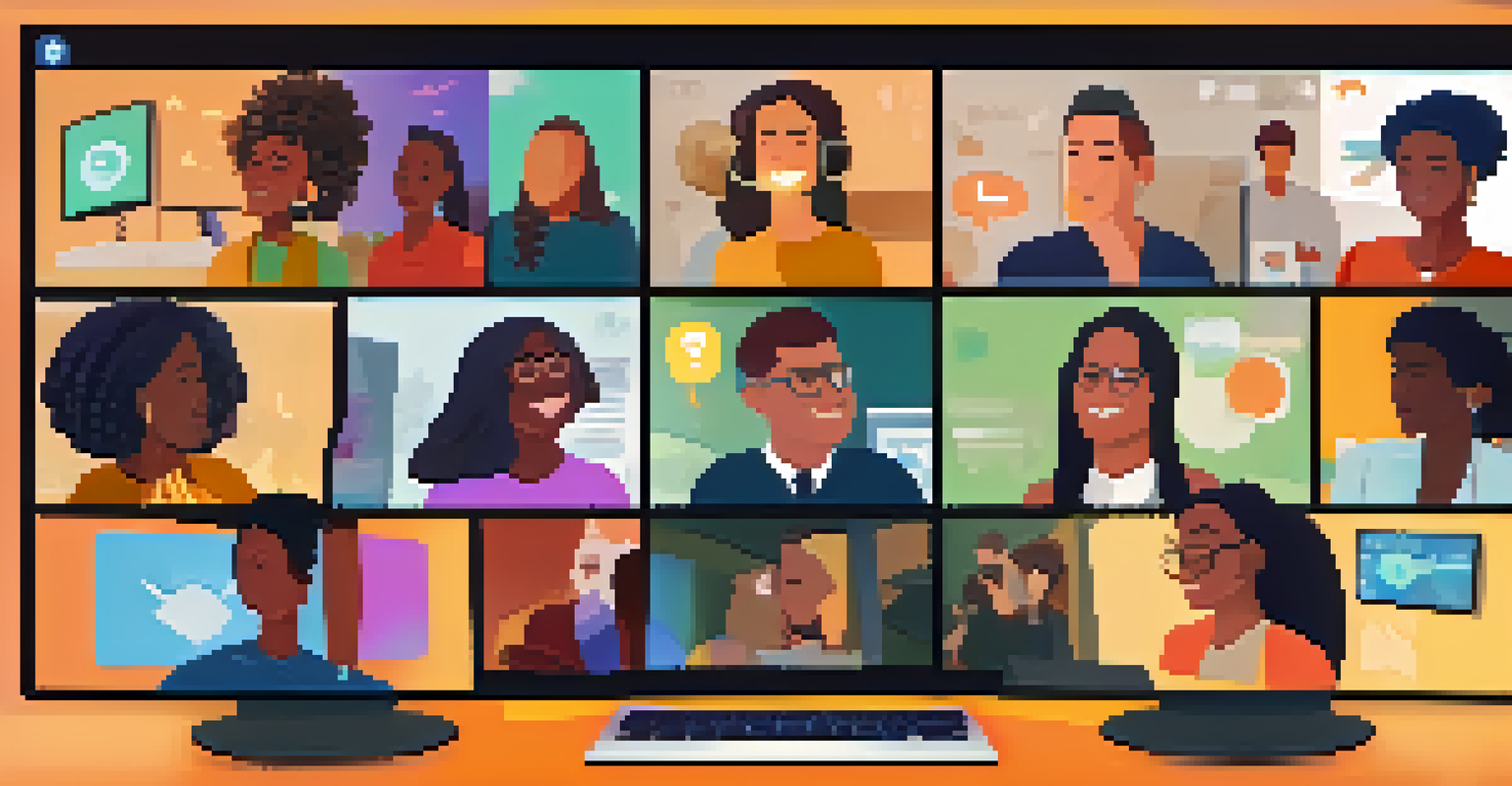Navigating the Challenges of Remote Mentoring

Understanding the Unique Dynamics of Remote Mentoring
Remote mentoring brings a unique set of dynamics that differ significantly from traditional face-to-face interactions. With geographical barriers and technology as our primary means of communication, it's essential to understand how these factors influence relationships. This mode of mentoring can lead to feelings of isolation for both mentors and mentees, making it vital to establish a sense of connection early on.
The best way to predict the future is to create it.
Moreover, the lack of physical presence can sometimes hinder the development of trust and rapport, which are crucial in any mentoring relationship. For instance, a mentor might miss non-verbal cues that would usually help gauge a mentee's feelings or understanding. This underscores the importance of being intentional in communication styles to foster a supportive environment.
Ultimately, recognizing these unique dynamics and proactively addressing them can pave the way for a more fruitful mentoring experience. By prioritizing connection and understanding, both mentors and mentees can navigate these challenges together.
Establishing Clear Communication Channels
Effective communication is the cornerstone of any successful mentoring relationship, and it's even more critical in a remote setting. Setting up clear communication channels, like video calls, instant messaging, or emails, can help ensure that both parties feel connected and informed. These channels should be agreed upon early on to avoid confusion and ensure that expectations are met.

Additionally, regular check-ins can play a significant role in maintaining open lines of communication. For instance, scheduling weekly or bi-weekly video calls can help both mentor and mentee stay engaged and aligned on goals. This consistency allows for timely feedback and support, which are vital for the mentee's growth.
Emphasize Clear Communication
Establishing clear communication channels and regular check-ins is vital for maintaining connection and engagement in remote mentoring.
Lastly, it's essential to be adaptable in communication styles. Some mentees may prefer written feedback, while others might thrive in verbal discussions. By being open to adjusting how you communicate, you can cater to your mentee's individual needs and enhance the overall mentoring experience.
Setting Clear Goals and Expectations
When embarking on a remote mentoring journey, setting clear goals and expectations is crucial for success. This step ensures that both the mentor and mentee are on the same page regarding what they aim to achieve together. By defining specific objectives, you create a roadmap that guides your interactions and helps measure progress over time.
What we fear doing most is usually what we most need to do.
For example, a mentor and mentee might agree on particular skills to develop or projects to complete by a certain deadline. This clarity not only provides direction but also motivates both parties to stay committed to the mentoring relationship. Furthermore, revisiting these goals regularly can help adjust them based on the mentee's evolving needs.
In essence, clear goals foster accountability and create a sense of purpose in the mentoring dynamic. They serve as a reference point that can help both mentor and mentee navigate challenges and celebrate achievements along the way.
Building Trust in a Virtual Environment
Trust is a foundational element in any mentoring relationship, but building it in a virtual environment can be challenging. Without face-to-face interactions, it requires deliberate efforts to cultivate this essential component. One effective strategy is to share personal stories and experiences, which can help humanize the relationship and create a deeper connection.
Consistent, honest communication also plays a vital role in building trust. When mentors demonstrate reliability and transparency, mentees are more likely to feel comfortable sharing their thoughts and challenges. For instance, opening up about your own struggles can encourage mentees to do the same, fostering an environment of mutual support.
Set Goals for Accountability
Defining clear goals and expectations helps both mentors and mentees stay aligned and motivated throughout the mentoring process.
Moreover, trust is built over time, so patience is key. By consistently showing up, being present, and actively listening, mentors can gradually establish a trusting relationship that allows for open dialogue and growth.
Utilizing Technology for Enhanced Engagement
Technology can be a powerful ally in remote mentoring, offering tools that enhance engagement and collaboration. Platforms like Zoom, Google Meet, or even collaborative tools like Miro can create interactive experiences that mimic in-person interactions. These technologies allow for visual aids, real-time collaboration, and a more dynamic way of sharing ideas.
Incorporating various tech tools not only keeps the mentoring sessions fresh and engaging but also appeals to different learning styles. For instance, using screen-sharing during discussions can help clarify complex concepts or provide visual feedback on work. This adaptability can make the mentoring experience more effective for everyone involved.
Additionally, leveraging technology for resources like shared documents or project management tools can streamline collaboration. By utilizing these digital platforms, mentors and mentees can work together more efficiently, ensuring that both parties remain engaged and focused on their goals.
Encouraging Self-Reflection and Growth
Self-reflection is a critical component of personal and professional growth, and remote mentoring provides a unique opportunity to foster this practice. Mentors can encourage mentees to regularly assess their strengths, weaknesses, and areas for improvement. By guiding them through reflective exercises, mentors can help mentees gain deeper insights into their development journey.
For example, incorporating journaling or guided questions during mentoring sessions can encourage mentees to articulate their thoughts and feelings. This practice not only promotes self-awareness but also allows for more meaningful discussions during meetings. The mentor can then provide constructive feedback based on these reflections, enhancing the learning experience.
Cultivate Trust Over Time
Building trust in a virtual environment requires consistent communication and sharing personal experiences to foster a supportive relationship.
Ultimately, fostering a culture of self-reflection empowers mentees to take ownership of their growth. It instills a sense of responsibility, encouraging them to seek out opportunities for learning and development beyond the mentoring relationship.
Celebrating Achievements and Progress
Celebrating achievements, no matter how small, is crucial in maintaining motivation and enthusiasm in remote mentoring relationships. Acknowledging progress reinforces positive behaviors and encourages mentees to continue striving for their goals. Mentors can create a culture of celebration by recognizing milestones during sessions or sending thoughtful notes of encouragement.
For instance, if a mentee completes a project or achieves a personal goal, taking the time to celebrate this achievement can significantly boost their confidence. This recognition not only validates their efforts but also strengthens the mentor-mentee bond, making the relationship more rewarding for both parties.

By consistently celebrating successes, mentors can help mentees feel valued and appreciated, which is especially important in a remote setting. This practice fosters a positive environment where both mentors and mentees can thrive, creating a lasting impact on their professional journeys.